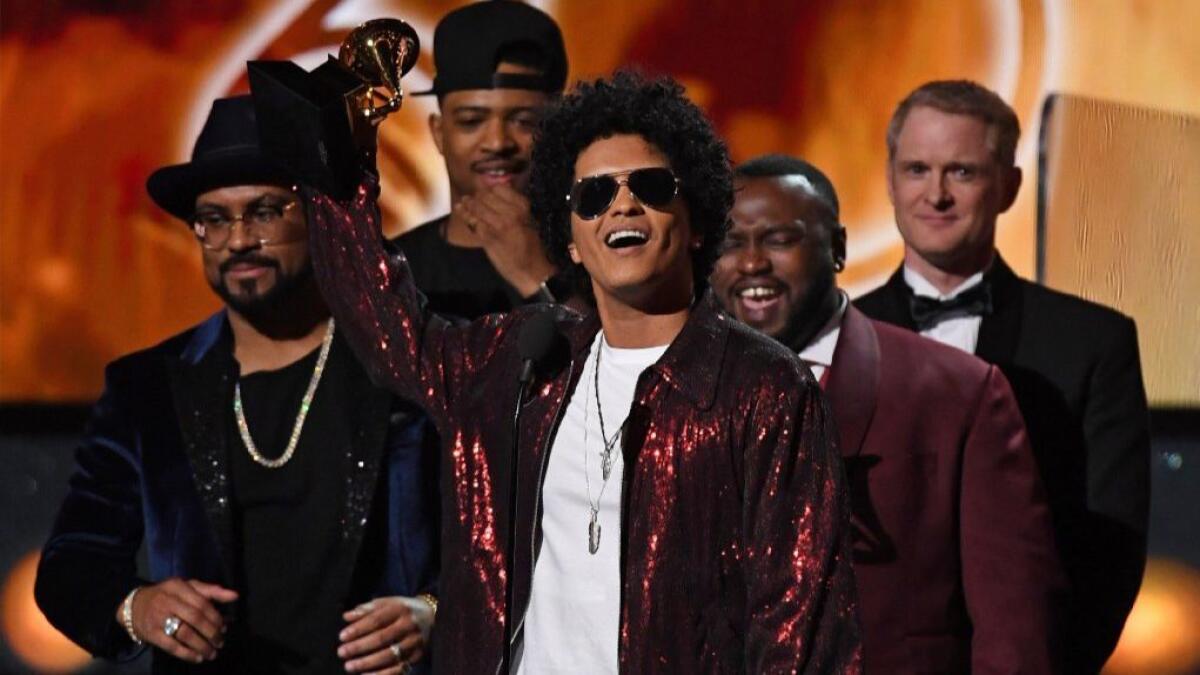Grammy Awards upset: Bruno Mars wins six trophies, Jay-Z none

You can lead 13,000 Grammy Award voters to hip-hop, but you can’t make them cast their ballots for it — at least not when it comes to the most prestigious categories in the world’s most prestigious annual music awards fete.
That was the message delivered depressingly loud and clear during Sunday night’s telecast of the 60th edition of the Grammys.
The performance-packed show, which aired live on both coasts from New York’s Madison Square Garden, saw the non-threatening Hawaiian retro-pop-soul-and-funk star Bruno Mars win a field-leading six awards, including Album of the Year, Song of the Year and Record of the Year.
The only problem is, an entirely different scenario was expected by many, in what was loudly touted as a landmark year of long overdue change for the Grammys.
This, you may recall, was supposed to be the year of hip-hop’s official coronation as the music of mainstream America.
The year when a hip-hop artist finally won for Record of the Year and Song of the Year, two categories that had never before gone to a hip-hop act.
The year when only the third hip-hop artist in Grammy history would win Album of the Year honors, following Lauryn Hill in 1999 for “The Miseducation of Lauryn Hill” and Outkast in 2004 for “Speakerboxxx/The Love Below.”
Guess again, even though this was the year when — for the first time in Grammy history — there was not one white male nominee for Album of the Year.
Hip-hop superstar Jay-Z entered the night with a field-leading eight nominations, including for Album, Record and Song of the Year. He went home without a single win, while Mars won in all six categories in which he was nominated.
It was painfully reminiscent of last year’s Grammys, when Jay-Z’s wife, Beyoncé, had a field-leading nine nominations and only won in two minor categories. Like husband, like wife, indeed.
Had Jay-Z been the big winner of the night, he would have the latest veteran artist to be belatedly recognized for a distinguished career who had never before won for Album of the Year. Previous examples include Bonnie Raitt in 1989, Eric Clapton in 1992, Steely Dan in 2001, Ray Charles (posthumously) in 2004 and Beck in 2014.
But it was not to be for Jay-Z, whose Song of the Year-nominated “The Story of O.J.” offers a remarkably frank and brutally eloquent evaluation of racial inequality in America.
Fellow hip-hop maverick Kendrick Lamar, who opened Sunday’s show with explosive power — and was briefly joined by U2’s Bono and The Edge — had seven nominations. He took home five trophies, including the Best Rap Album award. But, like Jay-Z, he was shut out in the Album, Song and Record of the Year categories.
So was Childish Gambino, who was nominated in those three categories but won only for Best Traditional R&B Performance.
This suggests votes for Gambino (the musical alter ego of actor/comedian Donald Glover) and, especially, hip-hop dynamos Jay-Z and Lamar canceled each other out.
It also suggests that perhaps the only way another hip-hop performer will win the Grammy for Album if the Year is if all of the nominations in that category are for hip-hop acts.
And it suggests the dance-happy, 1980s-styled funk and pop-soul on Mars’ victorious “24K Magic” album was more palatable to Grammy voters than the far more volatile and politically charged songs of Lamar and Jay-Z.
Indeed, in his show-closing acceptance speech for his award-winning album, Mars, 32, singled out Babyface, Teddy Riley and Jimmy Jam and Terry Lewis — four of the most successful R&B songwriters and producers of the ‘80s and ’90s — as key influences.
“They are my teachers, my foundation; this album wouldn’t exist without them,” said Mars, who expressed hope his album would inspire feelings of love and joy in his listeners.
That, it very well may. But Mars’ feel-good songs seem all but irrelevant — except as aural balm — in an increasingly divided nation.
And it is that division, and related issues that Jay-Z and Lamar so forcefully addressed on their Grammy-nominated albums. The best music can reflect its time in relevant and insightful ways that provoke thought. Mars’ feel-good songs, while impeccable crafted and performed, evoke nostalgia for a bygone era,
It’s worth noting that the Grammys only introduced a Best Rap Album category in 1995 and a Best Rap Song category in 1989, when D.J. Jazzy Jeff and The Fresh Prince won for their innocuous “Parents Just Don’t Understand.”
Smith, the Fresh Prince and fellow nominee Slick Rick boycotted that year’s show after learning the announcement of the winner in their category would not be televised. Kool Moe Dee and and the Rialto-bred female rap trio J.J Fad did attend.
But none of them have had a sustained international impact like Jay-Z, an elder statesman of hip-hop who is still making pertinent music.
Jay-Z’s criticisms of the state of the nation have not gone unnoticed by President Donald Trump, who this weekend tweeted: “Somebody please inform Jay-Z that because of my policies, Black Unemployment has just been reported to be at the LOWEST RATE EVER RECORDED!”
Trump’s tweet followed a Saturday interview on CNN’s new “The Van Jones Show,” in which Jay-Z lamented that the president’s profane comments about Africa and Haiti were “hurtful” and “disappointing,” especially coming from “the leader of the free world.”
“It’s not about money at the end of the day,” Jay-Z told Jones. “Money doesn’t equate to happiness, that’s missing the whole point. Treat people like human beings, that’s the main point. It goes back to the whole thing (of): ‘Treat me really bad and pay me well.’ It’s not gonna lead to happiness.”
Last year’s Grammy telecast was full of pointed comments about our sadly polarized nation and outright denunciations of Trump, who had then been in office for barely a month. Everyone from host James Corden, Beyoncé and Katy Perry to pioneering hip-hop group A Tribe Called Quest, Busta Rhymes and the usually apolitical Jennifer Lopez spoke out in no uncertain terms.
Sunday’s telecast initially seemed to go out of its way to avoid controversy, although Dave Chappelle — who won the Best Comedy Album award — did offer a mid-song interjection during Lamar’s show-opening performance.
“I just wanted to remind the audience that the only thing more frightening than watching a black man be honest in America is being an honest black man in America.”
It was a harbinger of more to follow.
While introducing Luis Fonsi and Daddy Yankee’s performance of “Despacito.” Best Comedy Album nominee Sarah Silverman said she wanted to encourage people to vote.
“That’s not true at all,” said NFL star Victor Cruz, who stood next to Silverman.
“No, we’re kidding, we’re totally kidding,” Silverman admitted. “Do what you want to do. It’s not a big deal. The world is basically over anyway.”
Sting didn’t make any spoken political comments, but the former Police front man did perform his 1987 solo song, “Englishman in New York,” which contains the lines: I’m an alien / I’m a legal alien / I’m an Englishman in New York.” He was joined by fellow singer Shaggy, who changed “Englishman” to “Jamaican.”
Two of the evening’s most stirring moments came with the introduction to, and performance of Kesha’s “Pray,” for which she was accompanied by “Pray” from Cyndi Lauper, Fifth Harmony singer-turned-solo star Camila Cabello, Julia Michaels, Bebe Rexha and San Diego’s Andra Day.
The performance was introduced by Janelle Monae, who told the audience: “We say time’s up for pay equality... times’ up for harassment of any kind. It’s not just going on in Hollywood, it’s not just going on in Washington. It’s going on right here in our industry
“We have the power to undo the culture that does not serve us well. So, let’s work together, women and men, as a united music industry committed to creating more safe work environments, equal pay and access for all women.”
Her comment about equal access may have hit closer to home than Monae intended. Australian singer Lorde was Sunday’s only female artist nominated for Album of the Year, but she was not invited to perform during the telecast.
Cabello followed up her performance with Kesha — who has been embroiled in litigation over alleged sexual abuse by her former record producer — by addressing immigration issues head on.
“I’m here on this stage tonight because, just like the dreamers, my parents brought me to this country with nothing in their pockets but hope,” Cabello, 20, said.
“They showed me what it means to work twice as hard and never give up. And, honestly, no part of my journey is any different from theirs. I’m a proud Cuban-Mexican immigrant, born in Eastern Havana, standing in front of you on the Grammys stage in New York City. And all I know is, just like dreams, these kids can’t be forgotten and are worth fighting for.”
She received a loud ovation. So, later in the show, did Hillary Clinton, one of several celebrities to read aloud excerpts from “Fire and Fury,” Michael Wolff’s controversial book about President Trump.
Earlier in the evening, after Childish Gambino and Cardi B performed “Finesse,” comedian Trevor Noah quipped: “I love that song. It takes me back, like, way back, to when Trump wasn’t president.”
One day, perhaps, a Grammy-winner or presenter will joke that a song takes them way back to a time when hip-hop didn’t account for the award-winners in the show’s top categories.
The results of Sunday’s 3½-hour telecast suggest that day may be a long way from now.
george.varga@sduniontribune.com
Twitter @georgevarga
UPDATES:
10:11 p.m.: This article was updated to include more information and analysis about the 2018 Grammy Awards.
Sign up for the Pacific Insider newsletter
You may occasionally receive promotional content from the Pacific San Diego.

